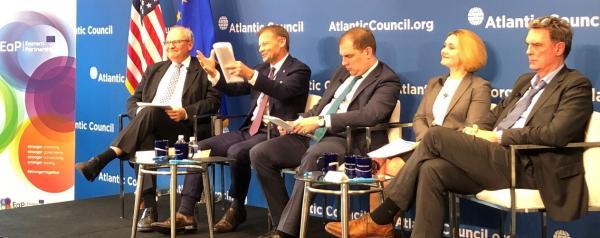
Since its launch, has the Eastern Partnership succeeded in strengthening economies and improving governance?
To answer this question, the Atlantic Council and the European Commission gathered representatives from the six Eastern Partnership countries Armenia, Azerbaijan, Belarus, Georgia, the Republic of Moldova, and Ukraine, and international financial institutions working in the region to take stock of successes and the challenges ahead.
EU Commissioner for European Neighbourhood Policy and Enlargement Negotiations Johannes Hahn kicked off the event, which was held on the margins of the IMF/World Bank Group Spring meetings. He emphasised the achievements of the Eastern Partnership since its launch in 2009 and in particular support for SMEs and energy efficiency. The Commissioner also reminded the audience that more efforts need to be made in the partner countries on rule of law, the implementation of key judicial reforms, and tackling the fight against corruption.
EIB Vice-President Vazil Hudak took up the theme again in a special panel on energy and connectivity where he highlighted the importance of energy security. He stressed EIB’s contribution to the Partnership, from its inception, through investment in SMEs as well as energy efficiency and renewables. But when pressed on future challenges, Mr Hudak pledged for a stronger involvement of European companies and private sector investors. Fellow IFI representative Jason Pellmar from the IFC agreed and reminded the audience that public finance alone would never provide all the required funds. Deputy Governor of Moldova’s National Bank, Cristina Harea, described the banking reforms her country has undergone and acknowledged the role of the Eastern Partnership in securing Moldova’s energy supply and reducing its dependence.

The Eastern Partnership is a joint initiative involving the European Union, its Member States, and six Eastern European Partners, set up in 2009 to build a common area of shared democracy, prosperity, stability and increased cooperation. As the EU’s bilateral development bank, the EIB has an important role to play in supporting the Eastern Partnership, particularly by providing investments in support of low carbon and climate resilient growth and employment.
By the end of 2018, EIB lending in the Eastern Partner countries reached EUR 8.5 billion, for 90 investment projects, supporting a number of EU priorities, including energy and transport connectivity, energy efficiency and access to finance for small and medium sized enterprises (SMEs).
Examples of EIB investment in the region include 12 electricity substations in Ukraine ensuring a reliable electricity source for citizens and companies. As well as this the EIB has financed energy efficiency and the modernisation of 650 kindergartens, schools, universities and 56 hospitals across Armenia, Moldova and Ukraine. This has cut energy consumption by around 60 %, reducing greenhouse gas emissions. In the water sector, since 2009 the EIB has supported 14 projects in the region amounting to EUR 572m, making high quality water and wastewater services available to local communities.